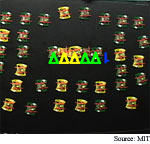|
NEWS
|

|
 |
Machine
copies itself like DNA
A device that combines air hockey and DNA marks
at least the third time this year the nascent field of
self-replicating machines has seen a significant advance...
|
Thoughts
wander in VR
Devices that allow for direct brain-computer communications
are advancing on two fronts: devices implanted in the
brain, and external electrodes that pick up the brain's
electrical signals. In general the external devices are
safer and cheaper, but the implants provide more control...
|
DNA
computing gets chipped
DNA computers can simultaneously check many possible
answers to large problems like determining the best possible
traveling salesman's route. There are billions of possible
routes that include just 15 cities, and there are no mathematical
shortcuts for solving this type of problem, which means
they easily overwhelm ordinary computers...
|
We
like people like us -- even fakes
Social science researchers have known for decades
that we view people who mimic our body language more favorably
than those who don't. It turns out that this effect holds
true for our interactions with artificial people as well...
|
Bits
and pieces
Magnetic logic, finding the flu, and mapping electrons. |
FEATURES
|
View
from the High Ground: USC's Michael Arbib
Computing matter, the action-perception
cycle, imagining tea with grandmother, passionate robots,
transferring brain settings, the Mirror System Hypothesis,
Hurricane Katrina, universal health care, and Goethe.
|
How
It Works: Two schools of cryptography
There are two approaches to securing information:
extremely difficult mathematical problems and the randomness
of nature. Both count on the limits of technology. |
|
 |
News RSS feed 
Blog RSS feed 
Bookshelf RSS feed

New: TRN's
Internet Services
TRN's Jobs Center
|
| |
|
| |
"If
we consider the fate of New Orleans with Hurricane
Katrina, we can certainly see challenges for technology
in terms of better design and maintenance of levees,
or in communication systems, but we also see the
fruits of pork-barrel politics, lack of planning
and coordination (technology can help, but one needs
bright dedicated people to make use of it), and
acceptance of a status quo in which too many people
live in poverty."
- Michael Arbib, University of Southern California |
|
| |
|
| |
Thanks
to Kevin from
GoldBamboo.com
for technical support |
|

